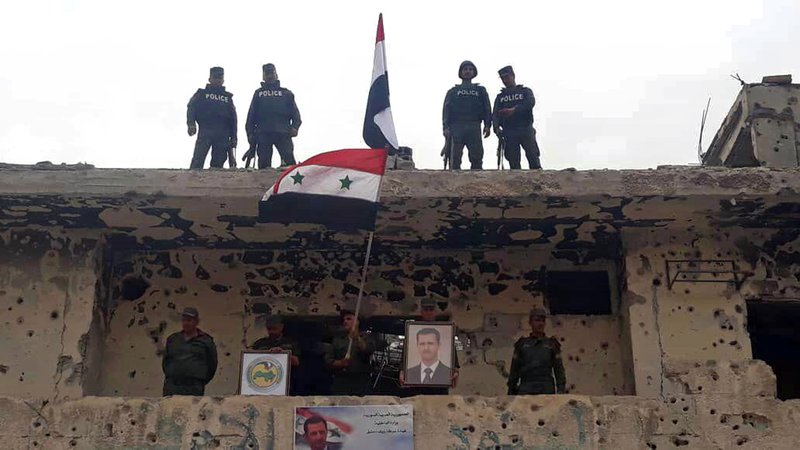MOSCOW -- Syria on Wednesday dismissed American calls for the withdrawal of Iranian troops and Lebanese Hezbollah militants from the war-torn country.
Syrian Deputy Foreign Minister Faisal Mikdad told Russia's Sputnik news agency that "this topic is not even on the agenda of discussion, since it concerns the sovereignty of Syria."
U.S. Secretary of State Mike Pompeo issued a list of demands this week for a new nuclear deal with Iran, including the pullout of its forces from Syria, where they have provided crucial support to President Bashar Assad's government. Russia is also a key ally of Assad, and has been waging an air campaign in Syria since 2015.
Mikdad said in Wednesday's remarks that Syria "highly appreciates" Russia's military support as well as "advisers" from Iran and Hezbollah. He added that "we cannot let anyone even raise this issue" of the Iranian withdrawal.
"Those who ask for something like that -- and this is definitely not our Russian friends -- are considering the possibility of intervention in all parts of Syria, including the support of terrorists in Syria and elsewhere in the region," Mikdad said.
At a meeting with Assad, who visited Sochi last week, Russian President Vladimir Putin noted that a political settlement in Syria should encourage foreign countries to withdraw their troops.
Putin's envoy for Syria, Alexander Lavrentyev, later commented that the Russian leader's statement was aimed at the United States and Turkey, along with Iran and Hezbollah. It marked a rare instance in which Moscow suggested Iran should not maintain a permanent military presence in the country.
Russia has argued that its troops have deployed at the Syrian government's invitation, while the military presence of the U.S. and others has been illegal.
Lavrentyev's statement appeared to reflect a difficult balancing act for the Kremlin, which hopes to maintain good relations with both Iran and Israel. Israel has warned that it will not accept a permanent Iranian military presence in Syria, and Israel struck a number of Iranian targets there earlier this month after what it said was a cross-border Iranian missile attack.
On Wednesday, Assad met with Lavrentyev in Damascus.
The two men discussed the Sochi meeting, according to Syrian state media, and Lavrentyev congratulated Assad on restoring full control over the capital and its suburbs. Assad, for his part, said Russia was a partner to his government.
During the talks with Assad, Putin also encouraged him to send representatives to a commission in Geneva that would work out proposals for Syria's new constitution as part of a peace process.
Mikdad said, however, that Damascus isn't ready yet to nominate its candidates to the body.
On the ground in Syria, meanwhile, a state-run media outlet reported early today that U.S.-led coalition airstrikes hit Syrian army positions in eastern Syria near the front lines with the Islamic State militant group.
The Central Military Media said the strikes targeted positions between Boukamal and Hmeimeh in the Deir el-Zour province and reported material damage, but there were no further details.
In Washington, a Pentagon spokesman, Marine Maj. Adrian Rankine-Galloway, said: "We have no information to substantiate those reports."
A war monitor, the Syrian Observatory for Human Rights, reported two waves of U.S.-led missile attacks early today that it said targeted areas controlled by the Islamic State east of the Euphrates River.
If confirmed, the attacks would be the first by the U.S. on Syrian army positions since April, when the U.S., Britain and France bombed government facilities in retaliation for a suspected gas attack blamed on Syria's government.
Information for this article was contributed by Albert Aji and other staff members of The Associated Press.
A Section on 05/24/2018

